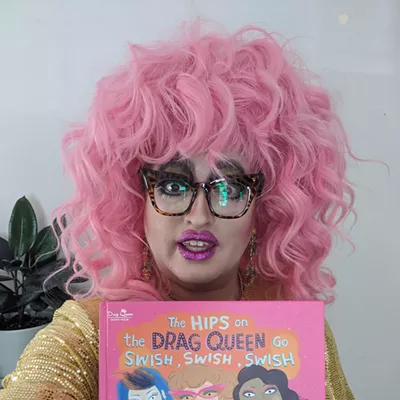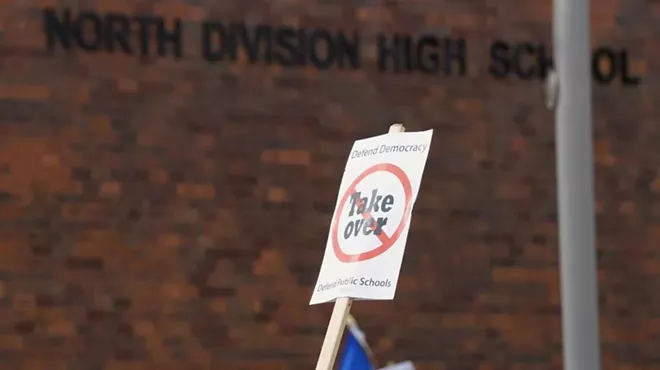Wednesday, March 30, 2016
Four Interesting Feminist Things Discussed by Three Generations of Feminists
In a world where media inundates curious and equally knowledge-absorbing millennials with strict guidelines of what it means to be a truly modern, intersectional and all together bad-ass feminist, it's easy to decide that a person is only a feminist if they fit x, y and z standards.
The topics discussed by Baby Boomer, Gen X and Millennial women and men last night at the UA's VOX: Voices for Planned Parenthood's "Multi-generational Feminism" chat at Revolutionary Grounds debunked the idea of these standards, though. Through discussing five intersectional feminist themes, participators supported the idea that a social movement as complex as feminism can't really require with a set of rules for inclusion. The five themes in questions:
1. Each generation of feminists defines the movement a little differently, and that's okay:
Older, (apparently) Baby Boomer and Gen X members of the discussion audience said they don't think identifying as a feminist is as important as installing feminist ideals of equality in society, while most Millennial audience members said identification is an important part of attaining equality, since the word "feminist" itself is so stigmatized. One older woman asked:
"Is labeling feminism so important? Fragmenting and getting stuck on the label, we’re not finding the places to make the bridge."
And another woman responded that the younger generation's anger with "feminist" being negatively perceived is warranted. "It’s so great to hear the youthful frustration around [embracing] the definition and [that] the definition has changed."
2. On that note—the definition of what it means to be a feminist changes, and is different for people of varying races, genders, sexualities, socioeconomic groups, etc.
One discusser said "[feminism] does change ... [because] we're from different parts of the county and different parts of the world," and most other participants chimed in agreement with her—feminists need to realize various individuals' experiences based on race, ethnicity, nationality, sexuality, socioeconomic status, etc., shape how they identify themselves with the movement, and if that varies from how you identify with it, that's okay.
Another discusser added that privilege has a lot to do with why feminism differs throughout cultural groups.
"[Feminism] started as white movement, and the definition has been so fluid, [but] the movement means something so different for every person .... We didn’t all have access to understand the feminine mystique."
On that note:
3. People can live by feminist ideals but refrain from identifying as one:
The number one, make-or-break millennial feminist rule is that in order to actually be a feminist, one must to proudly declare those three magic words: "I am a feminist."
While I agree that identifying with feminism is part of what makes it powerful, a couple women at the discussion—one a first-generation Guatemalan-American and the other a first-generation Mexican-American—reminded me that not every person has the same privilege to flaunt their feminist scarlet letter.
The Guatemalan-American woman told the group how her cousins, who still lives in Guatemala, would love to vocally support feminism and its various ideas, but just can't due to the cultural condemnation they would face from their families and other Guatemalans.
"I get to have these conversations with my cousins about how I am so proudly a Planned Parenthood employee [and feminist], and they lament the fact they aren’t able to be out about these things," she said. "It’s too much to be comfortable—they aren’t ready."
The Mexican-American woman said that though she identifies as a feminist, she agrees that cultural ostracization is a real fear that hinders would-be feminists from speaking out. She said Mexico's stereotypical machismo ideology dominated her home life and taught her she was less than a man, compelling her to flee and attend college to prove her worth to her parents.
"It was to say, 'I’m worth it,'" she said. "I’m more than who you think I am.”
4. The feminist movement isn't black and white:
Every member of the culturally diverse discussion group agreed that feminism is the basic belief that women should be equal to men and that intersectionality is a vital aspect of the movement, but that's really the only black-and-white definition the night unearthed. Discussers also agreed that feminism is personal subject to individual experiences, and that makes it quite a grey subject.
But grey isn't bad—it's just more complex than the textbook feminism media and other feminists impress onto other people.
———
A quote to sum up the night—and a reminder for us sometimes one-track-minded, feminist millennials—comes from Rookie Mag editor-in-chief and founder, Tavi Gevinson:
"...Feminism [is] not a rule book, but a discussion, a conversation, a process.”
The topics discussed by Baby Boomer, Gen X and Millennial women and men last night at the UA's VOX: Voices for Planned Parenthood's "Multi-generational Feminism" chat at Revolutionary Grounds debunked the idea of these standards, though. Through discussing five intersectional feminist themes, participators supported the idea that a social movement as complex as feminism can't really require with a set of rules for inclusion. The five themes in questions:
1. Each generation of feminists defines the movement a little differently, and that's okay:
Older, (apparently) Baby Boomer and Gen X members of the discussion audience said they don't think identifying as a feminist is as important as installing feminist ideals of equality in society, while most Millennial audience members said identification is an important part of attaining equality, since the word "feminist" itself is so stigmatized. One older woman asked:
"Is labeling feminism so important? Fragmenting and getting stuck on the label, we’re not finding the places to make the bridge."
And another woman responded that the younger generation's anger with "feminist" being negatively perceived is warranted. "It’s so great to hear the youthful frustration around [embracing] the definition and [that] the definition has changed."
2. On that note—the definition of what it means to be a feminist changes, and is different for people of varying races, genders, sexualities, socioeconomic groups, etc.
One discusser said "[feminism] does change ... [because] we're from different parts of the county and different parts of the world," and most other participants chimed in agreement with her—feminists need to realize various individuals' experiences based on race, ethnicity, nationality, sexuality, socioeconomic status, etc., shape how they identify themselves with the movement, and if that varies from how you identify with it, that's okay.
Another discusser added that privilege has a lot to do with why feminism differs throughout cultural groups.
"[Feminism] started as white movement, and the definition has been so fluid, [but] the movement means something so different for every person .... We didn’t all have access to understand the feminine mystique."
On that note:
3. People can live by feminist ideals but refrain from identifying as one:
The number one, make-or-break millennial feminist rule is that in order to actually be a feminist, one must to proudly declare those three magic words: "I am a feminist."
While I agree that identifying with feminism is part of what makes it powerful, a couple women at the discussion—one a first-generation Guatemalan-American and the other a first-generation Mexican-American—reminded me that not every person has the same privilege to flaunt their feminist scarlet letter.
The Guatemalan-American woman told the group how her cousins, who still lives in Guatemala, would love to vocally support feminism and its various ideas, but just can't due to the cultural condemnation they would face from their families and other Guatemalans.
"I get to have these conversations with my cousins about how I am so proudly a Planned Parenthood employee [and feminist], and they lament the fact they aren’t able to be out about these things," she said. "It’s too much to be comfortable—they aren’t ready."
The Mexican-American woman said that though she identifies as a feminist, she agrees that cultural ostracization is a real fear that hinders would-be feminists from speaking out. She said Mexico's stereotypical machismo ideology dominated her home life and taught her she was less than a man, compelling her to flee and attend college to prove her worth to her parents.
"It was to say, 'I’m worth it,'" she said. "I’m more than who you think I am.”
4. The feminist movement isn't black and white:
Every member of the culturally diverse discussion group agreed that feminism is the basic belief that women should be equal to men and that intersectionality is a vital aspect of the movement, but that's really the only black-and-white definition the night unearthed. Discussers also agreed that feminism is personal subject to individual experiences, and that makes it quite a grey subject.
But grey isn't bad—it's just more complex than the textbook feminism media and other feminists impress onto other people.
———
A quote to sum up the night—and a reminder for us sometimes one-track-minded, feminist millennials—comes from Rookie Mag editor-in-chief and founder, Tavi Gevinson:
"...Feminism [is] not a rule book, but a discussion, a conversation, a process.”
Tags: university of arizona , VOX , voices for planned parenthood , multi-generational feminism , feminism , feminism discussions













